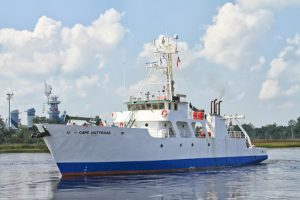Marine Technology
The Marine Technology curriculum is designed to provide the practical skills and academic background essential for success in the area of marine scientific support. The Marine Technology student will become proficient in the knowledge and skills required of a scientific support technician, through both practical training aboard ship as well as in the classroom. The Marine Technology curriculum prepares individuals to use and maintain sophisticated equipment such as electronic navigation devices, physical and chemical measuring instruments, sampling devices, and data acquisition and reduction systems aboard ocean-going and smaller vessels.
Course Information
Graduate Success: According to the most recent graduate employment survey, 94% of Marine Technology graduates reported that they were employed full-time in industry or were continuing their education at a higher level.
Related Information
Quick Facts
Enrollment: Cape Fear is among the largest of North Carolina’s 58 community colleges. Over 30,000 people attend classes at CFCC every year. The College’s enrollment in credit programs topped 9,200. Over 5,000 individuals are enrolled in various Continuing Education courses during any semester.
Economic Impact: For every dollar spent by county taxpayers in support of CFCC, $32.61 goes back into the local economy.
Student Demographics: 80% white; 20% non-white; 53% female; 47% male. The average age of a CFCC student is 29
Drug Screen and Physical Paperwork
R/V Cape Hatteras

In the spring of 2013, the college purchased the R/V Cape Hatteras [LINK] from the National Science Foundation. This ship has a 30 year pedigree of providing a platform for ocean research science.

